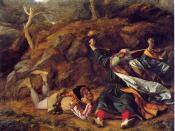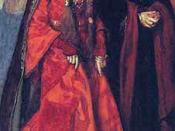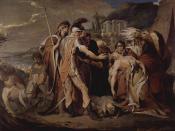King Lear, by William Shakespeare, is a tragic tale of filial
conflict, personal transformation, and loss. The story revolves
around the King who foolishly alienates his only truly devoted
daughter and realizes too late the true nature of his other two
daughters. A major subplot involves the illegitimate son of
Gloucester, Edmund, who plans to discredit his brother Edgar and
betray his father. With these and other major characters in the
play, Shakespeare clearly asserts that human nature is either
entirely good, or entirely evil. Some characters experience a
transformative phase, where by some trial or ordeal their nature
is profoundly changed. We shall examine Shakespeare's stand on
human nature in King Lear by looking at specific characters in
the play: Cordelia who is wholly good, Edmund who is wholly
evil, and Lear whose nature is transformed by the realization of
his folly and his descent into madness.
The play begins with Lear, an old king ready for retirement,
preparing to divide the kingdom among his three daughters. Lear
has his daughters compete for their inheritance by judging who
can proclaim their love for him in the grandest possible
fashion. Cordelia finds that she is unable to show her love
with mere words:
"Cordelia. [Aside] What shall Cordelia speak? Love,
and be silent."
Act I, scene i, lines 63-64.
Cordelia's nature is such that she is unable to engage in even
so forgivable a deception as to satisfy an old king's vanity and
pride, as we see again in the following quotation:
"Cordelia. [Aside] Then poor cordelia!
And not so, since I am sure my love's
More ponderous than my tongue. "
Act I, Scene i, lines 78-80.
Cordelia clearly loves her father, and yet realizes that her
honesty will not please him. Her nature is too good...


